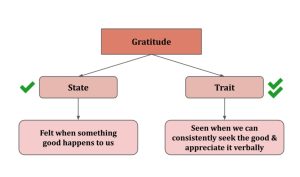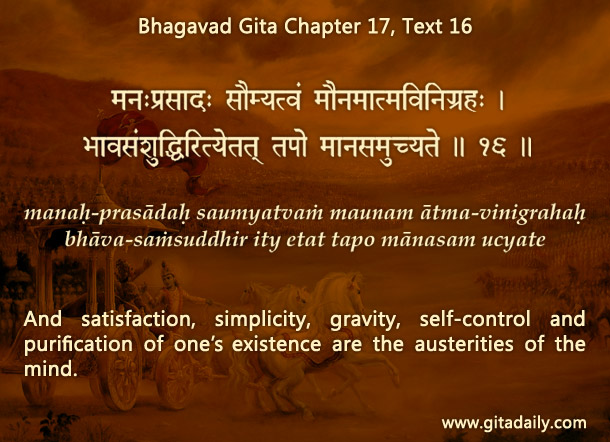 Gratitude can be both, and it is best when manifested as both. Let’s see how.
Gratitude can be both, and it is best when manifested as both. Let’s see how.
State: Gratitude as a state refers to the emotions of positivity, joy and contentment that we feel when we have something of value and when we value that thing. This state can arise within us when something good happens to us or when something good is done for us by someone. If we never experience this state, we will lead an emotionally barren existence wherein we never appreciate what is good in life and fixate only on what is bad. To experience the state of gratitude at least intermittently is the beginning of emotional health and positivity. If we can regularly enter into that state and experience it, then that itself is something to be grateful for.
Trait: Gratitude as a trait is the natural tendency of a person to look for things that are good in one’s life and to not just rejoice in the resulting positivity but to also radiate that positivity by expressing thanks to those who have done something for us. Gratitude as a character trait makes a person attractive in others’ eyes. We all like to feel valued; and when we do something of value for someone else, we feel happy when they appreciate and articulate what we have done for them. Wouldn’t the same apply to others who do something good for us?
Significantly, gratitude as a trait is seen not just in our public interactions but also in our personal contemplations. That means even when we are alone, we dwell on the good things in our life and thereby stay content and cheerful, as recommended in Bhagavad-gita (17.16).
One sentence summary:
Gratitude as a state occurs when something good that we seek happens in our life; and gratitude as a trait enables us to notice and appreciate the good things of life even if they are small and otherwise unnoticeable.
Think it over:
- What does gratitude as a state mean? How is it different from gratitude as a trait?
- When did you recently experience a state of gratitude?
- How can you cultivate gratitude as a trait?
***
17.16: And satisfaction, simplicity, gravity, self-control and purification of one’s existence are the austerities of the mind.
To know more about this verse, please click on the image


Leave A Comment